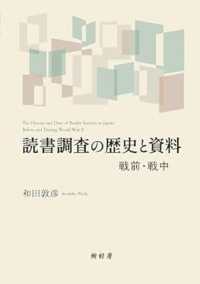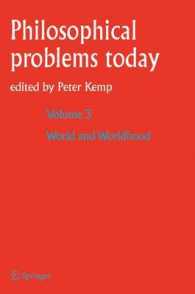- ホーム
- > 洋書
- > 英文書
- > Philosophy
Full Description
Crossing the Stream, Leaving the Cave brings philosophers from two of the world's great philosophical traditions--Platonic and Indian Buddhist--into joint inquiry on topics in metaphysics, epistemology, mind, language, and ethics. An international team of scholars address selected questions of mutual concern to Buddhist and Platonist: How can knowledge of reality transform us? Will such transformation leave us speechless, or disinterested in the world around us? What is cause? What is self-knowledge? And how can dreams shed light on waking cognition? What do the paradoxes thrown up by abstract thought about fundamental notions such as being and unity reveal? Is it possible to attain unity in ourselves, and should we even try? Would doing so make us happy--and is such happiness consistent with both contemplation of reality and action in the world? With close readings of texts by Buddhaghosa, Nagarjuna, Vasubandhu, Dignaga, Bhaviveka, Santideva; by Plato, Plotinus, Porphyry, Olympiodorus, and Damascius (among others), these studies consider not just the different answers Buddhists and Platonists might give to these questions, but also the criticisms they might bring to each other's positions, the sort of arguments they use, and the use they put these arguments to. Bringing Platonic and the Buddhist perspectives jointly to bear creates a cosmopolitan philosophical exchange which yields greater conceptual clarity on the questions and the terms in which they are cast, reveals unnoticed conceptual connections, and opens up new possibilities for addressing central philosophical concerns.
Contents
Amber D. Carpenter and Pierre-Julien Harter: Introduction: Doing Philosophy between Worlds: Creative Exchanges between Indian Buddhist and Platonic Philosophers
1: Amber D. Carpenter: Explanation or Insight? Competing Transformative Epistemic Ideals
2: Joachim Aufderheide: Dreaming, Perception, and Knowledge in Plato's Theaetetus and Vasubandhu's Twenty Verses
3: Rachana Kamtekar: Causal Pluralism in Vasubandhu and Plato
4: Paul M. Livingston: Unity and Predication in Plato's Parmenides and Nāgārjuna's Root Verses
5: Alexis Pinchard: Plato's Catuṣkoṭi and Nāgārjuna's Parmenides
6: Pierre-Julien Harter: Paradox, Not Contradiction: Discursive Accounts of the Non-Discursive in Plotinus and Bhāviveka
7: Christian Coseru: Know Thy Knowing: On the Reflexive Form of Self-knowledge
8: Michael Griffin: Concentration in Action in Greek Neoplatonism and Buddhaghosa
9: Chiara Robbiano: Looking for Harmony: Plato's and Śāntideva's Creative Attempts to Stay Together
10: Sara Ahbel-Rappe: Socrates and Śāntideva: Compassion, the Prudential Principle, and Philosophy in Plato's Dialogues and Śāntideva's Bodhicaryāvatāra
11: Stephen Harris: The Philosopher Returns to Saṃsāra: Plato and Śāntideva on Benevolence, Self-Interest, and Happiness








